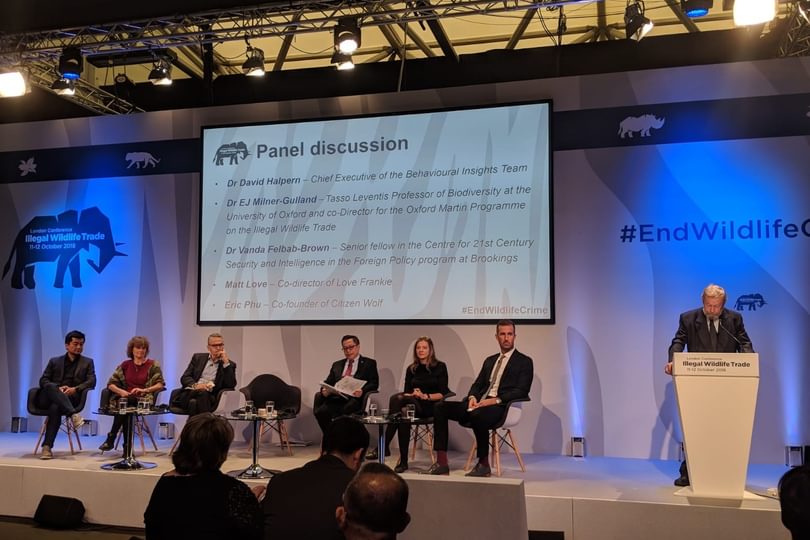
Researchers from the Oxford Martin Programme on the Illegal Wildlife Trade have been invited by the UK government’s Department for Environment, Food and Rural Affairs (Defra) to take part in a new consortium of specialists in demand reduction and behaviour change, as part of efforts to tackle the global trade in illegal wildlife products.
The Rt Hon Thérèse Coffey MP, who announced the consortium at the UK government’s Illegal Wildlife Trade Conference in London today (Friday 12 October), said the its members would be invited to share knowledge and experience, in order to develop recommendations on approach and scope of targeted illegal wildlife trade demand reduction initiatives.
Other organisations invited to participate include TRAFFIC, the Wildlife Conservation Society, United for Wildlife, UNEP and USAID. Workshops will be held in key demand countries and recommendations developed in order to invite proposals for new and innovative projects, for trial in one or more demand countries.
Professor E.J. Milner-Gulland, Co-Director of the Oxford Martin Programme on the Illegal Wildlife Trade, said: “We are delighted to have been invited to be part of this initiative, which shows that the UK government is not only committed to developing a robust understanding of the issues at stake, but is conscious of the importance of research evidence in setting priorities and designing programmes that can engender behavioural change and reduce demand for wildlife products.”
The announcement follows the recent publication of the Defra-funded report, Reducing Demand for Illegal Wildlife Products: Research analysis on strategies to change illegal wildlife product consumer choice, of which Professor Milner-Gulland was a co-author.
At the London conference, Professor Milner-Gulland took part in a panel discussion on reducing demand for illegal wildlife products. Asked what made interventions most effective, she said: "We need to be much cleverer about methods we use to address the illegal wildlife trade. Effective interventions need to have clear objectives - it can't just be awareness raising. We need to have very clear target audiences and know exactly whose behaviour we want to change. It could be governments, it could be consumers, it could be traders.
"We need to design interventions effectively using best practice, which we can learn from other sectors, and we need to base it on foundational research. We need to monitor and evaluate so that we can learn for the future and genuinely understand the impact on our target audience. We also need to share our results so that we can build upon each other's work."
Prior to the London conference, the Oxford Martin Programme on the Illegal Wildlife Trade co-hosted a ground-breaking conference, Evidence to Action: Research to Address the Illegal Wildlife Trade, on 9 October, with BIOSEC University of Sheffield, Lancaster Environment Centre, the Durrell Institute of Conservation and Ecology, and the Institute of Zoology (IOZ).
The event brought together researchers and end-users from across all sectors working on the illegal wildlife trade to find new ways of working together to tackle this complex topic.
- Watch a video of the demand reduction panel discussion
- Read the Programme's briefing note, Evidence to Action: Research to address the illegal wildlife trade
- Image: Professor E.J. Milner-Gulland (second from left) and Professor Sir John Beddington, President of ZSL and former Oxford Martin School Senior Adviser (right), at the UK government's London 2018 Illegal Wildlife Conference. (Photo credit: Laure Cugnière)